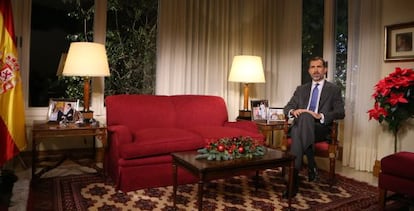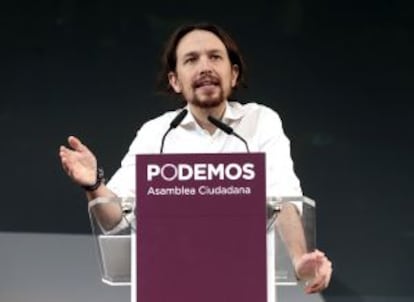Mainstream political parties laud King Felipe’s first Christmas address
But each group claims monarch's words support its own recipe for fixing Spain’s troubles

Spain’s main parties all approved, albeit to varying degrees, Felipe VI’s first ever Christmas Eve address to the nation.
Although there was disagreement on how best to bring about the “democratic regeneration” demanded by the king, his direct acknowledgment of Spain’s problems – including corruption, unemployment and the secessionist challenge in Catalonia – was broadly appreciated.
The ruling Popular Party noted that Felipe VI supports the Constitution as it currently stands
But individual parties also made a self-interested interpretation of statements that, they claim, support their own views on how to fix the economic, social and political crisis gripping the country.
For instance, the ruling Popular Party (PP) noted that Felipe VI supports the Constitution as it currently stands because he said it “guarantees our democratic, orderly, peaceful and free coexistence.”
Constitutional reform has been on the national agenda for over a year, with the Socialists and many regional nationalist parties supporting the need to change the 1978 charter.
Meanwhile, the Socialists claimed that the king’s comments about the economy were a slap in the face “for those who feel the crisis is a thing of the past and that this Christmas season is the season of recovery,” a clear reference to Prime Minister Mariano Rajoy’s early December claim that “the crisis is history.”
“Unemployment figures are still unacceptable and they frustrate the expectations of our young people and of many other men and women who have been out of a job for a long time,” the 46-year-old monarch had said on December 24.
Catalan premier Artur Mas expressed satisfaction at Felipe VI’s decision “to admit that there is a problem in Catalonia-Spain relations.”
“Recognizing that a problem exists is the first step in trying to fix it, which means treating Catalonia with the kind of respect it deserves and allowing its citizens to decide their own future, which is the crux of the matter,” said Mas, who is currently facing prosecution for staging a symbolic referendum on self-rule for the region in violation of a Constitutional Court freeze.

“What makes Spain a uniquely strong nation is the sum of all our differences,” said Felipe VI in his speech, encouraging everyone to “keep building all together a project that respects our plurality and creates hope for the future […]. Mix-ups are not resolved through emotional or sentimental breakups. Let us all make a loyal, sincere effort.”
Even Podemos, the grassroots party that has been accused of populism by the mainstream forces because of its sweeping attacks on what it describes as the political “caste,” had a few good things to say about the king’s speech.
“I share aspects of the head of state’s diagnosis of the situation,” said Podemos leader Pablo Iglesias on Twitter.
But, he added, “he is wrong if he thinks that the people who got us into the crisis are going to get us out of it.”
The sharpest criticism came from United Left, who said the speech was “disappointing and contradictory”
Another party official, Irene Montero, noted that “the king talked about hope, but hope is not going to put an end to unemployment or corruption.”
The sharpest criticism, however, came from the United Left bloc, whose chief Cayo Lara said the speech was “disappointing, contradictory and supported maintaining the status quo.”
There was great expectation over whether Felipe VI would mention his sister Cristina de Borbón, who will stand trial for tax fraud in connection with a larger criminal investigation into her husband Iñaki Urdangarin’s business dealings.
While the king devoted a third of his speech to corruption, he avoided mentioning Cristina directly, opting instead for a broad entreaty to “cut corruption at the root, without any hesitation.”
“It is necessary to prevent that kind of conduct from taking hold in our society,” said Felipe VI. “Citizens need to be sure that public money is administered for legal ends, and that holding public office does not entail preferential treatment and that it does not become a means to take unfair advantage or get rich.”
Tu suscripción se está usando en otro dispositivo
¿Quieres añadir otro usuario a tu suscripción?
Si continúas leyendo en este dispositivo, no se podrá leer en el otro.
FlechaTu suscripción se está usando en otro dispositivo y solo puedes acceder a EL PAÍS desde un dispositivo a la vez.
Si quieres compartir tu cuenta, cambia tu suscripción a la modalidad Premium, así podrás añadir otro usuario. Cada uno accederá con su propia cuenta de email, lo que os permitirá personalizar vuestra experiencia en EL PAÍS.
¿Tienes una suscripción de empresa? Accede aquí para contratar más cuentas.
En el caso de no saber quién está usando tu cuenta, te recomendamos cambiar tu contraseña aquí.
Si decides continuar compartiendo tu cuenta, este mensaje se mostrará en tu dispositivo y en el de la otra persona que está usando tu cuenta de forma indefinida, afectando a tu experiencia de lectura. Puedes consultar aquí los términos y condiciones de la suscripción digital.








































